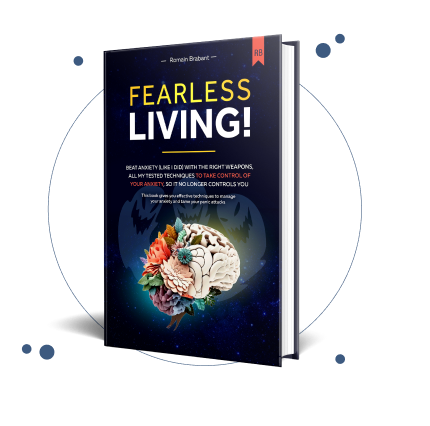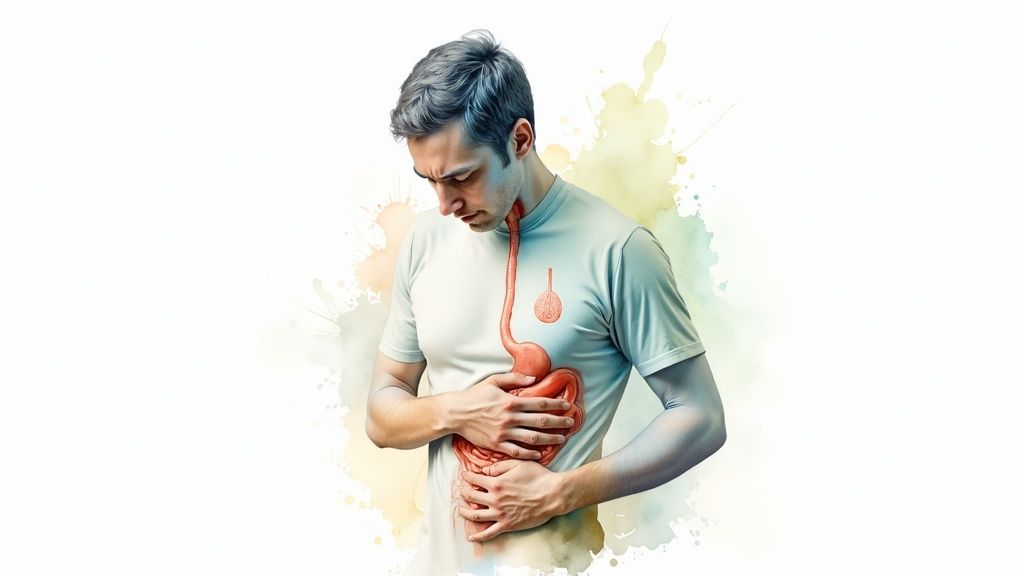
If you’ve ever wondered whether anxiety is really the cause of your stomach pain, let me clear it up for you: Yes. Absolutely.
That persistent ache, sharp cramp, or nervous knot isn’t just ‘in your head.’ It’s a very real, physical response to emotional distress. This guide is here to walk you through why this happens and, more importantly, to show you a clear, hopeful path toward feeling better.
Your Path to Healing Anxiety and Stomach Pain
Feeling physical pain from an emotional state can be confusing and isolating, but you are far from alone. This connection is a fundamental part of our biology, and understanding it is the first step toward a life with less pain and more peace.
Understanding why your stomach acts up when you're anxious is the first, most critical step toward taking back control. It helps you see that what you’re feeling is legitimate and, most importantly, that healing is entirely possible.
If you recognize these symptoms, know that there are effective strategies to manage them. The goal isn't just to cope with the pain but to build a foundation for a life free from panic. Your journey to healing starts right here, by acknowledging the powerful link between your mind and your gut.
This is not a life sentence. With the right tools and understanding, you can soothe both your anxiety and the physical discomfort it creates, opening the door to a calmer, more joyful life.
Before we dive deep, here's a quick snapshot of how these symptoms, triggers, and relief strategies connect.
Quick Guide to Anxiety-Related Stomach Pain
| Symptom | Anxiety Trigger | Path to Relief |
|---|---|---|
| Nausea or "butterflies" | Fight-or-flight response diverts blood from the stomach | Deep breathing, mindfulness, grounding techniques |
| Cramps or sharp pains | Increased stomach acid and muscle tension | Gentle stretching, hydration, stress-reducing activities |
| Bloating or gas | Swallowing air during rapid breathing, slowed digestion | Mindful eating, avoiding trigger foods, calming teas |
| Diarrhea or constipation | Stress hormones disrupt normal digestive speed | Consistent routine, fiber-rich diet, regular exercise |
This table gives you a starting point. Now, let's explore the science behind it so you can truly understand what's happening inside your body and how you can begin to heal.
The Gut-Brain Superhighway
The connection between your emotions and your digestive system is powered by the gut-brain axis—a constant, two-way communication network. Think of it as a biological superhighway where your thoughts and feelings directly influence what happens in your gut.
The infographic below illustrates this powerful relationship.
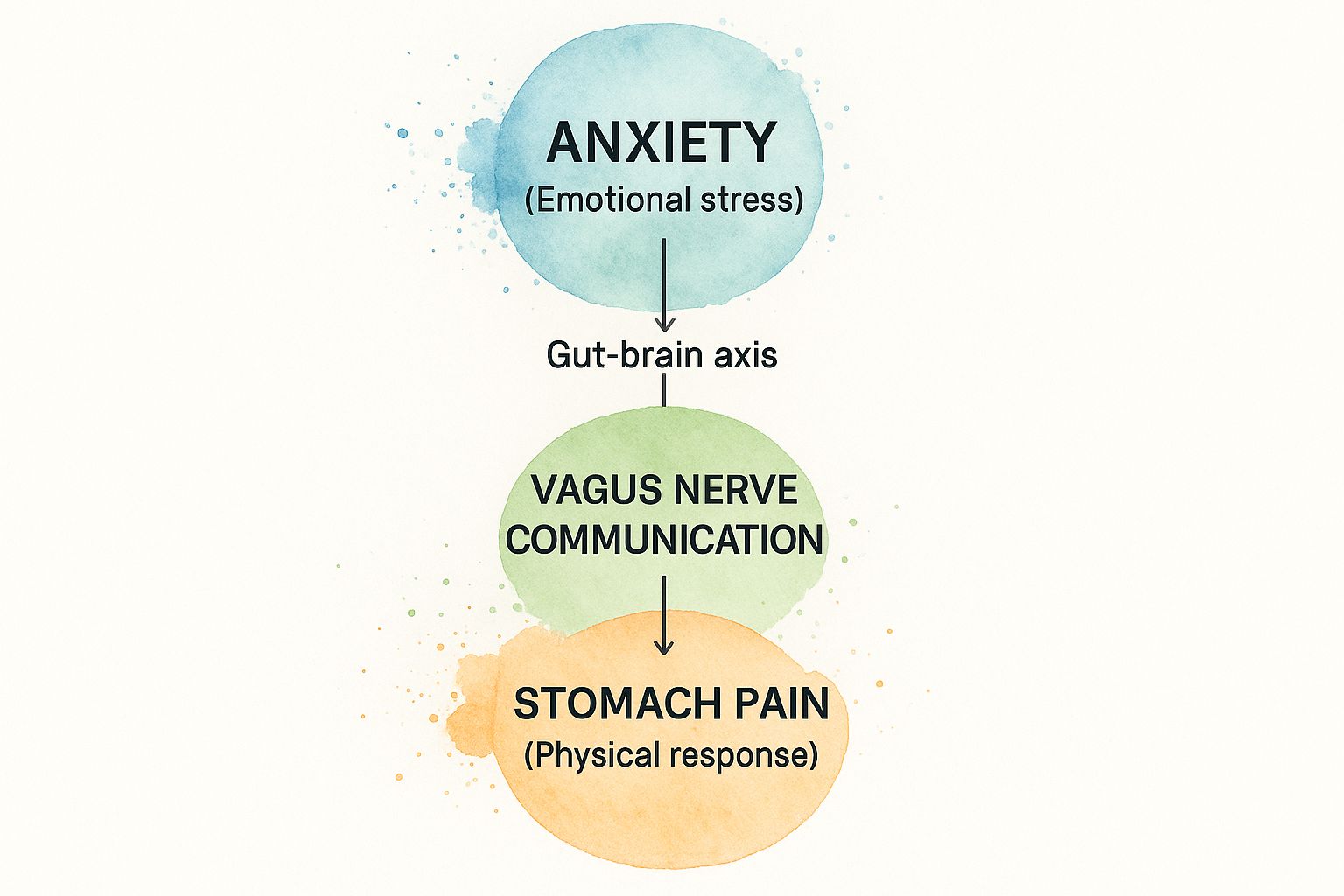
When you feel stressed or anxious, your brain sends signals flying down this nerve pathway. The result? A direct, immediate physical response in your stomach.
This connection explains why you're not imagining the discomfort. Globally, anxiety disorders are incredibly common, affecting approximately 359 million people in 2021. Yet, only about 27.6% of those suffering get any form of treatment, often because the physical symptoms are misunderstood or dismissed. You can learn more about these global anxiety trends00155-2/fulltext) and find hope in knowing just how many people share this experience and are on the same path to recovery.
Exploring the Gut-Brain Connection
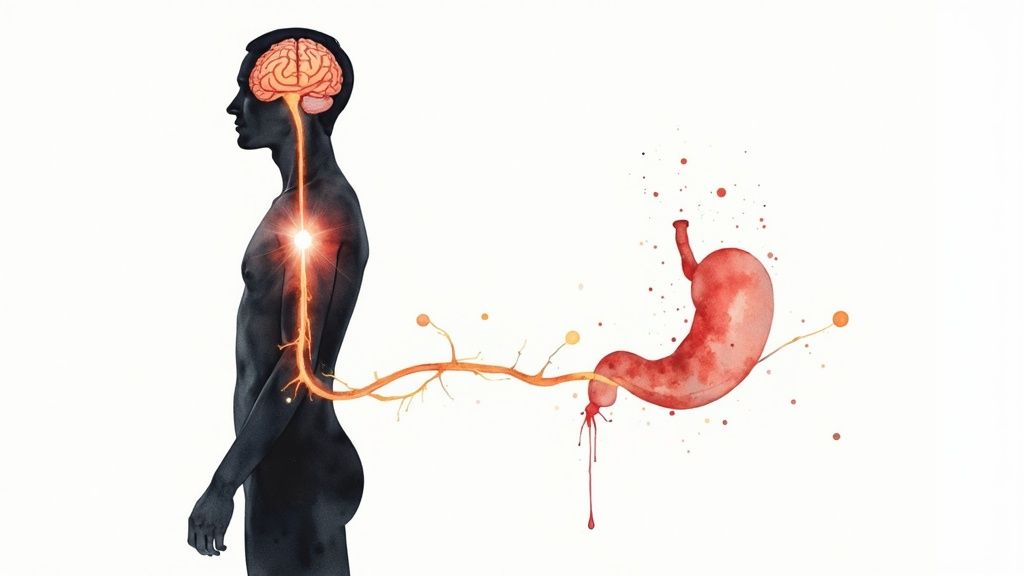
Ever felt "butterflies" in your stomach before a big presentation? Or that nauseous, sinking feeling when you’re really nervous? That’s not just in your head. It’s a real, physical sensation happening because of the gut-brain connection.
Think of it as a superhighway of communication between your emotional command center (the brain) and your digestive system. Messages are zipping back and forth constantly, making sure they’re always in sync.
This isn't just a metaphor. Your gut is lined with hundreds of millions of nerve cells—so many that scientists have nicknamed it the "second brain." This network, called the enteric nervous system (ENS), has a direct hotline to your actual brain through a massive nerve called the vagus nerve.
When your brain senses a threat—whether that’s an actual lion or just the fear of an upcoming exam—it hits the panic button. Alarm signals race down the vagus nerve, and your gut is one of the first to get the memo.
The wild part? Your body doesn't know the difference. The stress of a tough conversation can trigger the exact same physical response as running from danger.
The Role of Stress Hormones
Once that fight-or-flight response kicks in, your system gets flooded with stress hormones like cortisol. In short bursts, cortisol is a lifesaver. But when anxiety keeps it flowing day after day, it starts to wreak havoc on your digestive system.
This hormonal surge is behind a lot of the discomfort you might feel:
- Increased stomach acid: This can lead to that burning feeling, indigestion, or even acid reflux.
- Painful muscle spasms: The muscles lining your intestines can clench up, causing sharp cramps.
- Changes in digestion speed: Food can either rush through too quickly (hello, diarrhea) or grind to a halt (leading to constipation and bloating).
- Disrupted gut bacteria: Chronic stress can throw the delicate ecosystem in your gut out of balance, which can impact everything from how you digest food to your mood.
Understanding this process is the first step toward healing. The pain isn't a sign that you're weak; it's a predictable, biological reaction to stress. Knowing this validates what you're feeling and opens the door to strategies that actually work to bring you relief.
A Two-Way Street of Communication
Here's the kicker: this highway runs in both directions. Just as your brain can upset your gut, an unhappy gut can send distress signals right back up to your brain, making your anxiety and low mood even worse.
This creates a frustrating cycle: anxiety causes stomach pain, and the stomach pain fuels even more anxiety. It can feel like you're trapped.
But there is so much hope. Breaking this loop often means calming both your mind and your gut. Simple lifestyle and dietary shifts can make a huge difference. By nourishing your gut, you start sending calming signals back to your brain, creating a positive feedback loop instead. If you're curious about where to start, you can explore some effective lifestyle and diet changes for anxiety management that support both your mental and digestive health.
Knowing that a real, biological process is behind your discomfort is powerful. It means your symptoms are real, and more importantly, they are treatable. You have the power to calm this system down and find lasting relief.
How to Identify Anxiety-Driven Stomach Pain
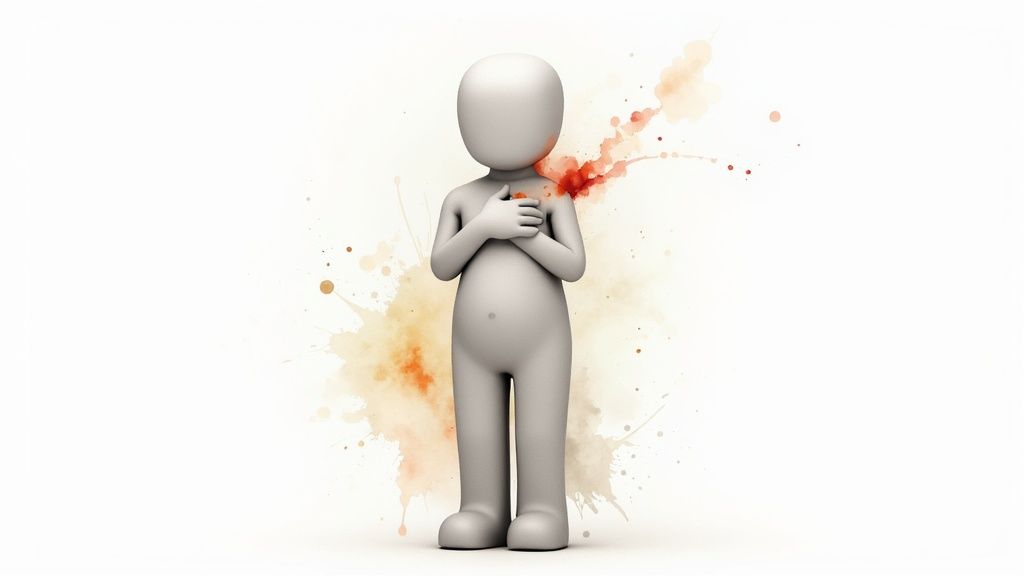
Is that knot in your stomach from stress, or is it something else? It’s a tough question, and one that can leave you feeling even more anxious. Figuring out the difference is the first real step toward finding relief that actually works.
One of the biggest clues that anxiety is causing stomach pain is timing. Does the discomfort—that dull ache, sharp cramp, or wave of nausea—seem to show up right before a big presentation? Or maybe during a difficult conversation? Pay attention to when it flares up.
If your stomach pain seems to follow your emotional state like a shadow, you’re likely feeling the physical fallout of your body’s stress response. It's a frustrating cycle, but simply seeing the pattern is a huge step forward. It means you can start addressing the real cause, not just chasing the symptoms, and begin your journey to a panic-free life.
Spotting Your Unique Patterns
Learning to connect the dots between how you feel emotionally and what’s happening in your gut is a skill. It’s also incredibly empowering. It shows you that the pain isn’t random—it's a direct signal from your body that something needs your attention.
With about 40% of people reporting abdominal discomfort over a three-month span, you're definitely not alone. Research consistently confirms that anxiety doesn't just cause these symptoms; it makes them significantly worse.
This all comes back to your body kicking into a state of high alert. To get a better handle on this, it's worth understanding the complete guide to the fight-or-flight response. That process explains exactly how your body prepares for a threat, often by putting your digestive system on the back burner.
Knowing the physical signs of a gut imbalance is also helpful. You can learn more about the unmistakable signs of an unhealthy gut to get better at telling your symptoms apart.
By becoming an expert on your own body, you transform confusion into clarity. This self-awareness isn’t just data; it’s the key that unlocks the door to a calmer mind and a settled stomach, proving that a panic-free life is absolutely within reach.
To help you get started, the table below breaks down some common differences between anxiety-related pain and other gut issues.
Symptom Checker: Anxiety Pain vs. Other GI Issues
This chart offers a quick way to compare symptoms. Think of it as a starting point to help you tune into what your body is trying to tell you.
| Symptom Feature | Likely Anxiety-Related | May Indicate Other GI Issues |
|---|---|---|
| Timing | Pain appears or worsens during stressful periods and eases when you feel calm. | Pain is constant, progressive, or unrelated to your emotional state. |
| Accompanying Feelings | Occurs alongside racing thoughts, worry, irritability, or a sense of dread. | No clear connection to mood; may be accompanied by fever, chills, or other systemic symptoms. |
| Pain Characteristics | Often described as "knots," "butterflies," dull aches, or sudden, sharp cramps. | May be localized to a specific spot, be severe and persistent, or change with certain foods. |
| Other Symptoms | Accompanied by other anxiety signs like a rapid heartbeat, sweating, or shallow breathing. | May include symptoms like unexplained weight loss, blood in the stool, or difficulty swallowing. |
Remember, this is just a guide. If your pain is severe, persistent, or you have any of the symptoms in the right-hand column, it's always best to check in with a doctor to rule out other conditions.
Practical Strategies to Calm Your Mind and Gut

Understanding the link between your anxiety and stomach pain is the first step. Now comes the empowering part: actually doing something about it. This is where your healing journey truly begins.
You can actively break the cycle of discomfort with simple, powerful techniques that calm both your mind and your gut at the same time. These strategies aren't just about masking symptoms; they're about taking back control and showing yourself that you have the power to change how you feel.
The goal is to interrupt the constant stream of stress signals traveling down that gut-brain highway. When you intentionally slow your breathing or bring your focus to the present moment, you're sending a powerful message back to your brain: "I am safe." This simple act flips on your body's natural relaxation response, easing the muscle tension that causes so much physical pain.
These tools offer immediate relief, but they also build long-term resilience. They prove you have the power to soothe your own system. Living a life free from panic and pain isn't a distant dream—it's an achievable reality, and the path starts with these small, consistent actions.
Activate Your Body’s Off Switch with Breathing
When anxiety hits, your breathing gets shallow and quick, trapping your body in a state of high alert. The single most effective way to reverse this is with diaphragmatic breathing, or what many call "belly breathing." This technique directly stimulates the vagus nerve, which pretty much acts like a brake pedal for your stress response.
Here’s a simple way to try it:
- Get Comfortable: Sit or lie down somewhere quiet. Place one hand on your chest and the other on your stomach.
- Inhale Slowly: Breathe in deeply through your nose for a count of four. You should feel your stomach rise and expand under your hand while your chest stays relatively still.
- Hold Gently: Hold your breath for just a second or two.
- Exhale Fully: Breathe out slowly through your mouth for a count of six, feeling your stomach fall.
Just repeating this five to ten times sends a wave of calm through your nervous system. You'll often feel noticeable relief from stomach cramps and nausea within minutes. If you want a more detailed guide, you can find a variety of breathing exercises for anxiety to help build this foundational skill.
Remember, your breath is your anchor. It’s always with you, and it’s the fastest, most direct tool you have to tell your body that the danger has passed. This allows your digestive system to finally relax and get back to business.
Ground Yourself to Escape Anxious Thoughts
When anxiety is causing stomach pain, it’s often because your mind is stuck in a loop of terrifying "what-if" scenarios. Grounding exercises are designed to pull you out of those future-focused fears and plant you firmly in the present moment. They work by redirecting your focus to your physical senses, which interrupts the flow of anxious thoughts.
A popular and effective method is the 5-4-3-2-1 technique:
- 5: Name five things you can see around you.
- 4: Identify four things you can touch.
- 3: Acknowledge three things you can hear.
- 2: Notice two things you can smell.
- 1: Name one thing you can taste.
This simple exercise forces your brain to concentrate on the here and now, which can quickly dial down the intensity of both your emotional and physical symptoms.
Of course, calming your gut also involves understanding what you're putting into it. Using a modern food journal app can feel like having your own personal health detective. It helps you track meals and spot potential triggers that might be making your anxiety-driven stomach pain worse. This awareness, combined with grounding techniques, creates a powerful two-pronged approach to healing.
Building a Long-Term Path to a Panic-Free Life
While quick coping skills are a lifesaver in the moment, the real goal is lasting freedom from both anxiety and the stomach pain it drags along with it. This isn’t about finding a magic bullet. It’s about building a sustainable, hopeful roadmap toward a resilient mind and a much happier gut. A panic-free life isn't just a fantasy—it's an achievable reality.
The journey is all about creating a strong foundation with consistent, supportive habits. These long-term solutions work together to gently calm your nervous system, bring balance back to your gut, and actually rewire your brain’s knee-jerk reaction to stress. It's a process of shifting your lifestyle to support your body's incredible ability to heal itself, proving you have the power to create lasting change.
Nourish Your Gut to Soothe Your Mind
What you eat has a direct line to your mood and stress levels. It’s a fact. A gut-friendly diet—packed with fiber, fruits, and veggies—helps the good bacteria in your gut thrive. In turn, these little helpers produce mood-regulating neurotransmitters like serotonin. Adding probiotic-rich foods like yogurt can give this delicate ecosystem an extra boost.
On the flip side, things like highly processed foods, too much sugar, and caffeine can throw your gut out of whack and crank up the volume on your anxiety. But you don't need to overhaul your entire diet overnight. Just start small.
- Toss one more vegetable onto your dinner plate each night.
- Swap a sugary soda for a glass of water or some herbal tea.
- Choose whole-grain bread instead of white.
These small steps create a powerful positive feedback loop. A happy gut sends calming signals to the brain, which helps dial down the very anxiety that was causing your stomach issues in the first place.
The Critical Role of Rest and Sleep
Sleep isn't a luxury; it’s a non-negotiable part of getting anxiety under control. When you’re running on empty, your body pumps out more of the stress hormone cortisol. This leaves you feeling on edge and makes your stomach way more sensitive to pain.
Aiming for 7 to 9 hours of quality sleep each night is one of the most powerful things you can for your mental and digestive health. Create a simple, relaxing bedtime routine—like shutting down screens an hour before bed or picking up a book—to signal to your body that it’s time to wind down. Consistent, restorative sleep helps regulate those stress hormones, giving both your mind and gut a much-needed chance to rest and repair.
Building a panic-free life is a process of reclaiming control one step at a time. It's about understanding that your daily choices have a profound impact on your well-being, empowering you to actively participate in your own healing.
Rewire Your Brain with Professional Support
Sometimes, lifestyle changes need a partner to create the most profound shift. That’s where professional guidance comes in. Therapeutic approaches like Cognitive Behavioral Therapy (CBT) are incredibly effective for breaking the vicious cycle of anxiety and physical pain.
CBT teaches you how to spot, challenge, and ultimately reframe the anxious thought patterns that trigger your body's fight-or-flight response. You can learn more about understanding CBT for anxiety to see how this structured, practical approach works. By changing your thoughts, you can change your body's physical reaction, leading to long-term relief and a renewed sense of hope.
Self-care is a powerful way to manage the physical symptoms of anxiety. But it's just as important to know when it’s time to bring a professional into your corner. Reaching out isn’t a sign of failure—it's a smart, proactive step toward real, lasting relief.
Sometimes, what feels like an anxiety-induced stomachache can actually be a sign of an underlying medical issue that needs a closer look. Your peace of mind is non-negotiable, and getting clarity is the first step.
Recognizing Red-Flag Symptoms
While anxiety can cause very real discomfort, certain symptoms are your body's way of saying, "Hey, pay attention to this." Don't brush these off. A conversation with your doctor is a must if you experience any of the following, as they can help rule out other conditions:
- Severe or worsening pain that doesn't let up, even when your anxiety subsides.
- Unexplained weight loss when you haven't changed your diet or exercise habits.
- Blood in your stool or stools that are black and tarry.
- Difficulty swallowing or feeling like food is constantly getting stuck.
- Fever or vomiting along with your stomach pain.
These symptoms need a professional evaluation to make sure you're getting the right care for the right problem.
Taking your physical symptoms seriously is a critical part of the healing process. It validates your experience and ensures you receive comprehensive care, paving the way for a hopeful, panic-free future where both your mind and body are supported.
How to Talk to Your Doctor
Bringing up the connection between your mind and your body with a doctor can feel a bit awkward, but it's one of the most important conversations you can have. You are your own best advocate.
Start by clearly describing your physical symptoms first. Then, explain the emotional patterns you’ve noticed. A simple opener like, "I've noticed my stomach pain gets so much worse when I'm feeling stressed or worried," can kickstart a really productive dialogue.
It’s worth noting that kids and teens are especially prone to stress-related stomach pain. For many young people, these aches are directly tied to nervousness and worry, and they often get better once the anxiety is addressed. You can learn more about how anxiety affects children's digestive health on Seattle Children's website.
Once your doctor has given you the all-clear on other medical issues, a mental health professional is your next best ally. If you need help finding the right person, our guide on choosing a psychiatrist for anxiety offers some great pointers. Getting the right support is an empowering move toward feeling better for good.
Common Questions About Anxiety and Stomach Pain
When your stomach is in knots and you suspect anxiety is the culprit, a lot of questions can pop up. Getting clear answers is the first step toward feeling in control again. Let's tackle some of the most common ones.
Can Anxiety Stomach Pain Feel Severe?
Yes, absolutely. Anxiety isn't just "in your head," and the stomach pain it causes can feel just as real and intense as any other physical problem.
It can range from a dull, persistent ache to sharp, stabbing cramps that double you over. This is your brain's stress response triggering very real physical changes in your gut—things like muscle spasms and a surge in stomach acid.
How Can I Tell the Difference Between Anxiety Pain and a Medical Issue?
This is a tricky one, but the key often lies in patterns and timing. Anxiety-related stomach pain tends to show up or get worse during stressful moments and often eases up when you start to feel calm.
If your pain is constant, getting progressively worse, or comes with red-flag symptoms like a fever, bloody stool, or unexplained weight loss, it’s crucial to see a doctor. The goal is always to rule out other medical conditions first.
The most important takeaway is this: you are not imagining it, and you are not alone. Understanding the connection between your mind and gut is the first step toward breaking the cycle. A hopeful, panic-free life is entirely within your reach.
Ready to take the next step toward a calmer mind and a settled stomach? The Anxiety Checklist provides a structured, actionable system to help you understand your triggers, manage your symptoms, and build lasting resilience. Start your journey to fearless living today at https://anxietychecklist.com.

